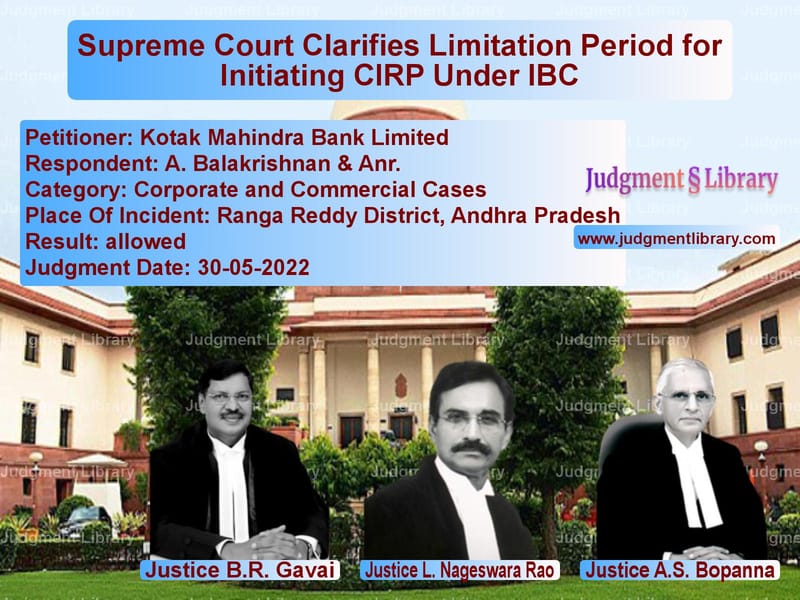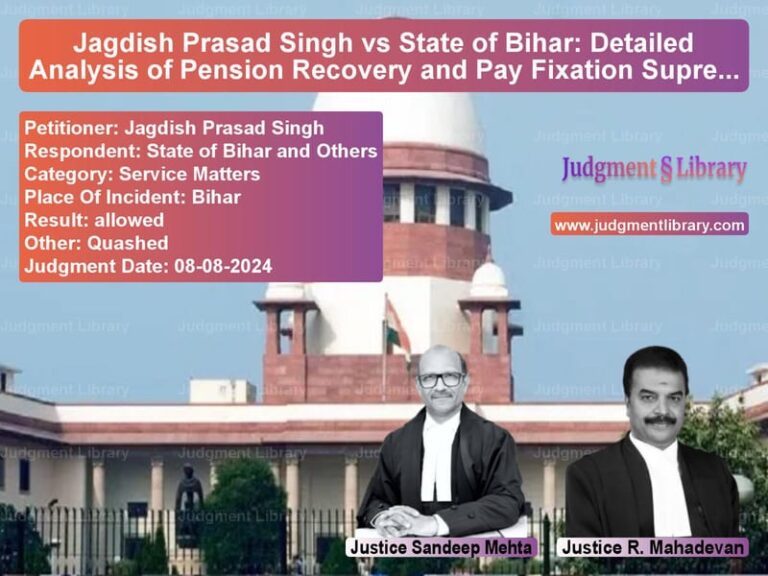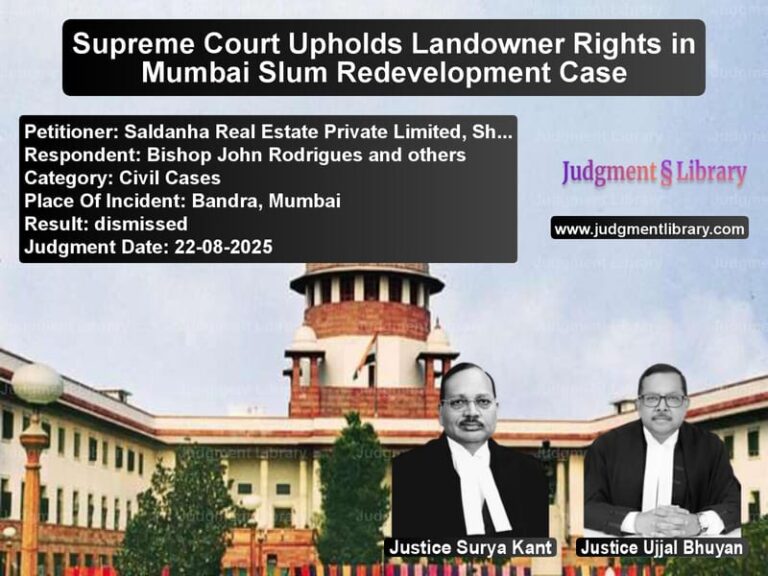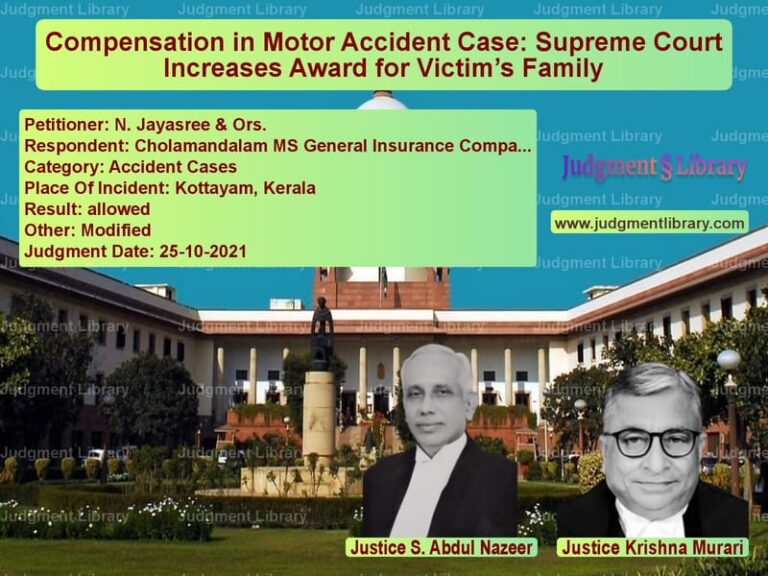Supreme Court Clarifies Limitation Period for Initiating CIRP Under IBC
The Supreme Court of India has delivered a crucial judgment in Kotak Mahindra Bank Limited vs. A. Balakrishnan & Anr., clarifying the limitation period for initiating Corporate Insolvency Resolution Process (CIRP) under the Insolvency and Bankruptcy Code, 2016 (IBC). This ruling addresses the significance of a Recovery Certificate issued by a Debt Recovery Tribunal (DRT) and whether it grants a fresh cause of action for creditors under the IBC.
Background of the Case
The dispute arose from financial transactions dating back to 1993-1994, when Ind Bank Housing Limited (IBHL) sanctioned credit facilities to three borrower entities: M/s Green Gardens (P) Ltd., M/s Gemini Arts (P) Ltd., and M/s Mahalakshmi Properties & Investments (P) Ltd. The Corporate Debtor, M/s Prasad Properties and Investments Pvt. Ltd., stood as the corporate guarantor and mortgaged its immovable property.
Following defaults by the borrowers, IBHL classified the accounts as Non-Performing Assets (NPA) in 1997 and initiated recovery proceedings:
- 1997: State Bank of India, the original lender, classified the loans as NPA and initiated legal recovery.
- 2006: The debts were assigned to Kotak Mahindra Bank Limited (KMBL).
- 2011: KMBL issued a demand notice under the SARFAESI Act.
- 2017: The DRT issued Recovery Certificates against the borrowers.
- 2018: KMBL filed a Section 7 application under the IBC, initiating CIRP.
- 2021: NCLAT ruled that KMBL’s application was time-barred.
- 2022: The Supreme Court overturned the NCLAT decision, ruling in favor of KMBL.
Key Legal Issues
- Does a Recovery Certificate issued by a Debt Recovery Tribunal provide a fresh limitation period for initiating CIRP under the IBC?
- Does the doctrine of merger prevent a financial creditor from filing an IBC application based on a Recovery Certificate?
- What is the correct interpretation of Section 7 of the IBC regarding financial creditors?
Arguments by the Petitioner (Kotak Mahindra Bank Limited)
Kotak Mahindra Bank Limited argued:
- The Recovery Certificate issued by the DRT in 2017 provided a new cause of action, making their IBC application timely.
- They relied on Dena Bank vs. C. Shivakumar Reddy, where the Supreme Court held that a fresh right to sue arises when a Recovery Certificate is issued.
- Section 7 of the IBC allows financial creditors to initiate CIRP based on a legally adjudicated claim.
- The borrowers had engaged in dishonest conduct by delaying payment for over two decades.
Counterarguments by the Respondent (A. Balakrishnan & Anr.)
The respondents contended:
- The limitation period started from the original date of default in 1997, making the IBC application time-barred.
- Once a claim is adjudicated, it merges into the Recovery Certificate, barring further legal action under the IBC.
- A Recovery Certificate is not equivalent to a financial debt under the IBC.
- IBC cannot be used as an alternative recovery mechanism for decreed debts.
Supreme Court’s Observations
1. Recovery Certificate Grants a Fresh Cause of Action
“A Recovery Certificate issued by a Debt Recovery Tribunal gives rise to a fresh cause of action, enabling the financial creditor to initiate CIRP under the IBC within three years from its issuance.”
The Court emphasized that a legally adjudicated claim retains enforceability under the IBC.
2. Borrowers Cannot Escape Repayment by Exploiting Limitation Law
“The intent of the IBC is to prevent financial defaulters from taking undue advantage of legal technicalities to evade repayment.”
The Court held that dishonest debtors should not use procedural delays to avoid insolvency proceedings.
3. Recovery Certificate Holders Qualify as Financial Creditors
“The definition of ‘financial debt’ under the IBC includes any debt that has been adjudicated and is legally enforceable, which includes debts under Recovery Certificates.”
The ruling reaffirmed the IBC’s scope in handling financial disputes.
Final Judgment
The Supreme Court ruled:
- The NCLAT’s decision declaring the CIRP application time-barred was quashed and set aside.
- A Recovery Certificate grants a fresh three-year limitation period for initiating CIRP.
- KMBL’s Section 7 application under the IBC was deemed valid and must proceed.
- The financial creditor’s rights under the IBC remain unaffected by previous recovery proceedings.
Impact of the Judgment
This ruling has significant implications:
- Strengthened Creditor Rights: Financial institutions can rely on Recovery Certificates to initiate CIRP.
- Clarity on Limitation Law: Reaffirms that a fresh cause of action arises upon issuance of a Recovery Certificate.
- Prevention of Legal Exploitation: Ensures that borrowers cannot indefinitely delay repayment using technical loopholes.
- Judicial Precedent: Sets a benchmark for similar insolvency cases involving Recovery Certificates.
The Supreme Court’s ruling reinforces the core objectives of the IBC, ensuring a time-bound resolution process while protecting the rights of financial creditors.
Petitioner Name: Kotak Mahindra Bank Limited.Respondent Name: A. Balakrishnan & Anr..Judgment By: Justice B.R. Gavai, Justice L. Nageswara Rao, Justice A.S. Bopanna.Place Of Incident: Ranga Reddy District, Andhra Pradesh.Judgment Date: 30-05-2022.
Don’t miss out on the full details! Download the complete judgment in PDF format below and gain valuable insights instantly!
Download Judgment: kotak-mahindra-bank-vs-a.-balakrishnan-&-an-supreme-court-of-india-judgment-dated-30-05-2022.pdf
Directly Download Judgment: Directly download this Judgment
See all petitions in Bankruptcy and Insolvency
See all petitions in Company Law
See all petitions in Corporate Compliance
See all petitions in unfair trade practices
See all petitions in Judgment by B R Gavai
See all petitions in Judgment by L. Nageswara Rao
See all petitions in Judgment by A. S. Bopanna
See all petitions in allowed
See all petitions in supreme court of India judgments May 2022
See all petitions in 2022 judgments
See all posts in Corporate and Commercial Cases Category
See all allowed petitions in Corporate and Commercial Cases Category
See all Dismissed petitions in Corporate and Commercial Cases Category
See all partially allowed petitions in Corporate and Commercial Cases Category







